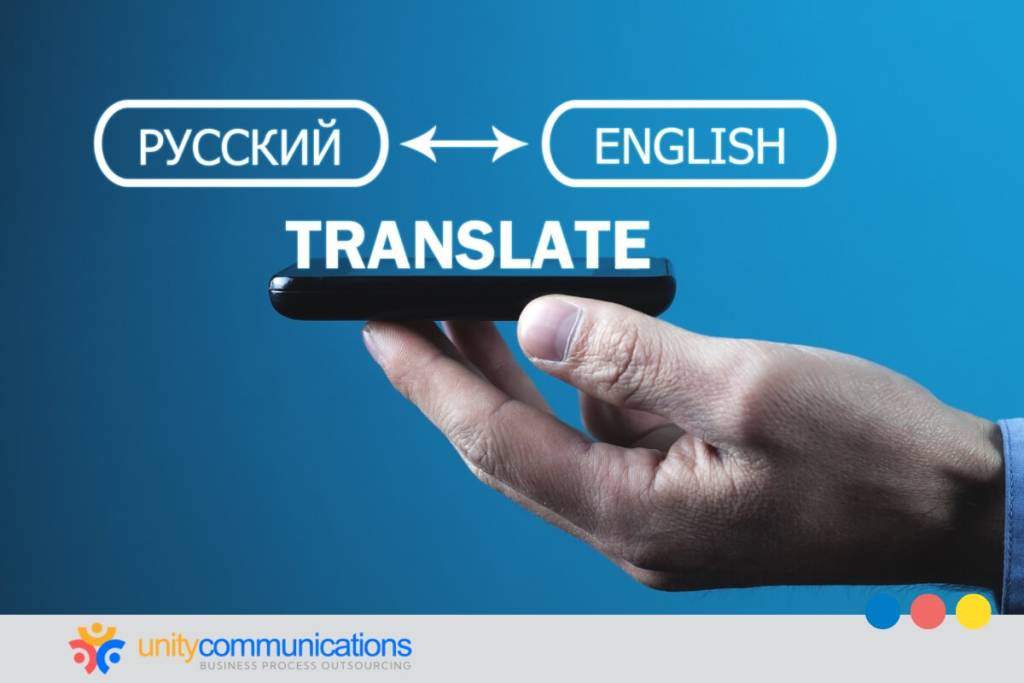IN THIS ARTICLE
Table of Contents
Today’s global marketplace demands effective language communication to exploit new opportunities and penetrate international markets. However, developing and maintaining multilingual communication capabilities in-house requires significant time, expertise, and cost that businesses might not have.
Outsourcing language translation is a viable solution. Business process outsourcing (BPO) allows businesses to access specialized expertise without the overhead of an in-house team, making it a smart choice for many.
This article explores the advantages of outsourcing translation services, the challenges you might face, and how to overcome them. Whether you’re new to outsourcing or refining your approach, this guide helps you optimize your global communication. Read on to learn more!
Benefits of outsourcing language translation

Multilingual communication is critical for businesses expanding globally and catering to an international customer base. A Common Sense Advisory study found that 65% of consumers prefer to interact with brands that offer content in their native language. About 40% outright refuse to buy from those that don’t.
What is BPO’s critical role in ensuring language capabilities, and how can it benefit your business? Outsourcing addresses language translation needs by providing access to global talent with the necessary skills. Moreover, BPO streamlines the process and optimizes operating costs.
Below are the benefits of outsourcing language translation:
Cost savings and efficiency
Outsourcing eliminates the need to build a full-time, in-house translation team and invest in advanced translation tools. Instead of spending on employee wages, software subscriptions, and equipment maintenance, you pay for on-demand language translation services.
This translates to significant cost savings. According to Deloitte, companies can save up to 30% in operating expenses by outsourcing non-core business functions.
Outsourcing also allows you to allocate resources more effectively and focus on strategic growth initiatives rather than operational overhead. Moreover, cost savings give you the financial capacity to adapt to market changes and scale. This way, your business remains competitive globally.
Access to professional expertise
Access to professional expertise is one of the key advantages of working with BPO providers. BPO firms employ skilled, multilingual translators with in-depth knowledge of industry jargon. They can translate content accurately while preserving the technical and cultural nuances crucial to your brand’s messaging.
BPO providers leverage advanced tools such as computer-assisted translation (CAT) software and machine translation with post-editing. Combined with human expertise, these technologies enhance translation speed and accuracy for faster turnaround times on large-scale projects.
Lastly, BPO companies invest in training and development to help teams stay current with linguistic trends and industry standards. Continuous professional development allows them to offer strategic insights into global communication strategies, such as adapting marketing campaigns to cultural contexts.
Cultural relevance
Cultural relevance is crucial for effective global communication. A message that works well in one region might be misunderstood in another if not correctly localized. BPO providers offer localization services that adapt your content to fit your target audience’s cultural norms, values, and expectations.
This cultural adaptation strengthens your connections with diverse markets and helps avoid potential cultural missteps that could damage your brand’s reputation. Culturally relevant communication increases customer satisfaction, loyalty, and advocacy across all your business’s regions.
Streamlined translation workflow
Outsourcing can streamline your language translation workflow by integrating project management and collaboration tools. BPO companies also implement best practices to improve processes.
BPO providers offer dedicated project managers to oversee the translation process. These professionals ensure that tasks progress smoothly, complete tasks on time, and address issues promptly. Moreover, they communicate updates and changes with all stakeholders, keeping all parties aligned and informed.
The challenges of outsourcing language translation

Outsourcing translation services offers significant advantages, but it also comes with challenges that companies must manage to achieve the best results.
Below are common hurdles of outsourcing translation and localization tasks and practical strategies to avoid or address them effectively.
Managing quality control
Producing and maintaining high-quality translations is a critical challenge when outsourcing. Poorly translated content can lead to misunderstandings, tarnish your brand’s reputation, and alienate customers. A Localization Industry Standards Association (LISA) report indicates that translation errors can cost businesses significantly regarding customer trust and financial penalties.
To mitigate this risk, choose a BPO provider with stringent quality control processes, including multiple layers of editing and the use of quality assurance software. This attention to detail is vital for maintaining the integrity of your brand across different languages.
Selecting the right translation service provider
Choosing the right BPO translation provider is a critical decision that can significantly affect your global communication strategy. The partner you select can influence translation quality, workflow efficiency, and brand reputation in international markets.
Not all translation service providers offer the same level of expertise, especially when it comes to specialized or niche industries. Find a BPO firm with industry experience, as its team can accurately translate terminology and understand nuances.
A thorough vetting process is essential. This should include trial projects to assess the provider’s capabilities firsthand and reference checks to verify their track record. Pay close attention to how well the provider communicates during this process. Precise, responsive communication strongly indicates how they will handle your projects.
By carefully evaluating potential BPO providers, you can select a partner who aligns with your business needs and produces high-quality, consistent translations. Due diligence is key to building a successful long-term relationship that supports your company’s international growth.
Handling confidentiality and data security
Data security is a significant concern when outsourcing language translation because you share sensitive information with a third-party provider. IBM reports that the average cost of a data breach is $4.45 million, underscoring the importance of robust data protection measures.
To safeguard your information, partner with a BPO provider that complies with international standards such as ISO 27001 and implements strict confidentiality agreements. These precautions protect your intellectual property and maintain customer trust.
Balancing speed and accuracy
Balancing speed and accuracy is a critical challenge in managing translation projects. Quick turnaround times can sometimes compromise translation accuracy, as rushed work increases the likelihood of errors. Inaccurate translations can lead to miscommunication, damage your brand’s reputation, and result in costly revisions.
Balance timely delivery with quality. Work closely with your BPO provider to set realistic timelines. Implement a multi-step review process that includes initial translation, proofreading, and quality checks. This approach minimizes errors and ensures the final output meets your brand’s standards.
Incorporate advanced translation tools to streamline workflow while maintaining consistency. Consider a tiered approach by prioritizing urgent tasks without compromising project quality. Even under tight deadlines, your translations remain accurate and reliable.
Overcoming time zone differences and scheduling issues
Overcoming time zone differences and scheduling issues is crucial when managing outsourced translation projects. Time zone disparities can lead to delays in communication, slow decision-making, and misaligned schedules, especially when dealing with tight deadlines. For companies working with offshore partners, coordinating tasks can become challenging.
Establish clear communication protocols from the outset to mitigate these challenges. This includes setting expectations for response times, defining primary communication channels, and scheduling regular check-ins during overlapping hours. Project management software and shared calendars can help streamline coordination and alignment.
Many BPO providers offer 24/7 support, which can be invaluable in overcoming time zone barriers. Round-the-clock support ensures that progress continues outside the client’s regular business hours, reducing bottlenecks and accelerating project timelines. This availability allows companies to address unexpected issues or last-minute changes promptly.
Companies can effectively manage time zone differences by leveraging continuous support and structured communication practices. This approach fosters a more seamless execution of translation projects, maintaining steady progress and minimizing delays caused by scheduling conflicts.
The bottom line

Outsourcing language translation can be a game changer for businesses looking to expand operations and customer bases globally. Although implementing BPO has its challenges, its advantages are worthwhile. Cost savings, access to expert translators, cultural relevance, and smooth workflow are compelling reasons to outsource.
The key to successful outsourcing lies in choosing the right BPO partner and establishing solid quality control processes. When done right, outsourcing allows you to focus on what matters: growing your business and connecting with customers worldwide.
Interested in enhancing your global communication? Let’s connect to discuss how we can support your goals. Unity Communications is an award-winning provider of adaptable BPO solutions for various industries.





